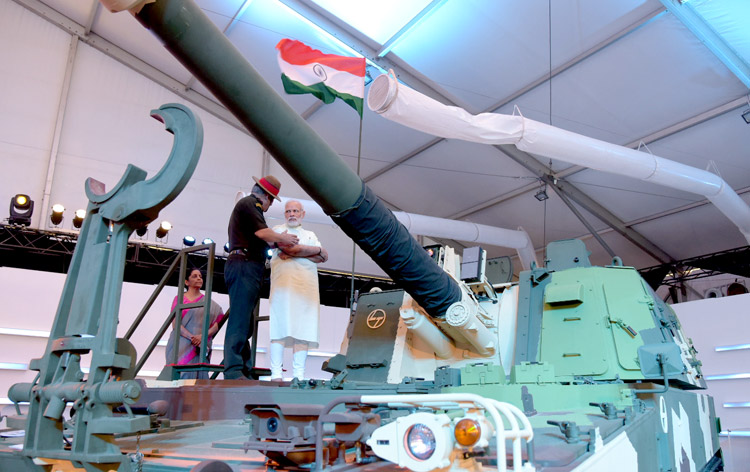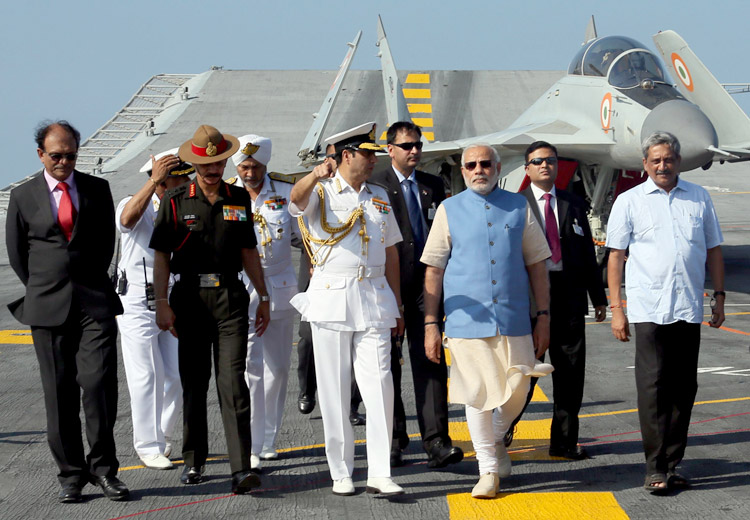INDIAN ARMED FORCES CHIEFS ON OUR RELENTLESS AND FOCUSED PUBLISHING EFFORTS

The insightful articles, inspiring narrations and analytical perspectives presented by the Editorial Team, establish an alluring connect with the reader. My compliments and best wishes to SP Guide Publications.

"Over the past 60 years, the growth of SP Guide Publications has mirrored the rising stature of Indian Navy. Its well-researched and informative magazines on Defence and Aerospace sector have served to shape an educated opinion of our military personnel, policy makers and the public alike. I wish SP's Publication team continued success, fair winds and following seas in all future endeavour!"

Since, its inception in 1964, SP Guide Publications has consistently demonstrated commitment to high-quality journalism in the aerospace and defence sectors, earning a well-deserved reputation as Asia's largest media house in this domain. I wish SP Guide Publications continued success in its pursuit of excellence.
- Prime Minister Modi Visits Punjab’s Adampur Air Base, Interacts with Airmen after Successful ‘Operation Sindoor’; Stern Message to Pakistan
- The layered Air Defence systems that worked superbly, the key element of Operation Sindoor
- Operation Sindoor | Day 2 DGMOs Briefing
- Operation Sindoor: India strikes back with Precision and Purpose
- Operation Sindoor: Resolute yet Restrained
- India’s Operation Sindoor Sends a Clear Message to Terror and the World – ‘ZERO TOLERANCE’
- Japan and India set forth a defence cooperation consultancy framework, talks on tank and jet engines
- Terrorist Attack in Pahalgam in Kashmir: Unfolding a long surgical war against PAK
- Lt General Pratik Sharma takes over Command of Indian Army's Northern Command
Corporate-funded R&D could make India a global player in Defence production
Extension of Corporate Social Responsibility concept to Security needed to generate the funds and efforts for a tech leap in the Military
 |
The Author is Director General of Information Systems, Indian Army |
For India, which is emerging as a major producer of defence technologies and equipment there is a dire need for a major drive for capacity building through a consortium approach. This calls for availability of unhindered budgets to meet the multifaceted challenges of developing infrastructure, capacities, capabilities, skills and a continuous development-operation cycle for timely delivery and regular upgradation.
Corporate sector plays a vital role in the economic development of a country, to the extent that the economy of the Nation depends largely on the achievements of corporate sector. 'Make in India' initiative of the Government, coupled with opening up of Defence Industrial Corridors, has provided a new dimension and paved the way for both indigenisation and self-reliance. In the last two decades, the private sector in Defence has expanded immensely with even the DPSUs outsourcing more than 30 per cent and Ordnance Factories (OFs) outsourcing approximately 60 per cent of their production inventories. Defence Industries are doing direct investment in large and hi-tech projects through the provisions of Defence Procurement Procedures (DPP) to include strategic partnerships, make projects and innovative developments in defence technology.

World over, the Defence system have been an enabler for innovations and a driving force for new technologies. Indian Defence Forces have been closely associated with the growth of Indian Defence Industry by way of incubating and developing technologies and equipment, with dual military and civil usage. However, with the fast paced flow in technology development, coupled with the need to fast track product development to beat obsolescence, support by the industry is no longer a choice, it is a compulsion. While Research and Development has its own time cycles from inception of an idea to delivery of the technology demonstrator, it is also at a huge cost. Consortium approach to developing technologies and technology demonstrators is the best way forward. The moot question is 'How can we fund development of technology demonstrators for defence in an optimum manner?' There is a case for considering Corporate Professional Responsibility as a sequel to Corporate Social Responsibility.
Corporate Social Responsibility (CSR) is a concept wherein it is the responsibility of the corporate sector to contribute towards social, economic and environmental development, which creates positive impact on society, at large. The concept revolves around the fact that the corporations need to focus beyond earning profits and participate in social development. As part of Corporate Social Responsibility, the companies are required to annually spend at least two percent of their total net profit for social, economic and environmental causes such as public health, education, sanitation, livelihoods, water conservation and natural resource management. In the same run, the industry also owes 'Corporate Professional Responsibility' towards the National security and technology development thereby promoting two way cooperation for self-reliance in Defence Technologies.
Concept
Growth of Industry in India
There has been an ever increasing pace of industrialisation coupled with continuous drive for infrastructure development and creation of conducive climate for industrial collaboration. This is likely to result in rapid growth and expansion of the corporate business organisations in India. The corporate sector in India today is not only making significant contributions to the country's economic development but also is playing a pioneering role in business diplomacy by extending their outreach abroad. India is at the cusp of becoming one of the largest growth engines in the world. Even though there is an overall growth of Indian Industries, at the core of this growth is the development made by Indian ICT Industry which grew with annual growth rates of nearly 30 per cent in the last decade. Apart from the Multinationals like IBM and HP, Information Technology Industry also has seen growth of successful Indian companies like TCS, Infosys, Wipro, HCL, to name a few, not only in India but also internationally. In recent past, Information Technology Companies like TCS and Infosys have emerged to be one of the fastest growing Information Technology service brands in the world with annual growth rates of upto 14 per cent. Infosys has grown incrementally from being a United States of America $250 worth company in 1981 to whooping United States of America $11.12 billion in 2018. The young entrepreneurs and startups have added to the exponential growth of the Information Technology Industry.
Industry – Defence Forces Synergy
Defence Industrial Bases/Corridors have been a huge enabler in all Nations producing defence equipment due to the huge potential in their development for self-reliance, both for internal and external security threats, proliferation through exports and dual civil-military usage. It is well known fact that all best practices of management being embraced by the Corporate World emanated from Defence. Internet and its world wide web visage has been developed by DARPA in United Nations of America, based on a need to network defence forces with operating bases beyond the frontiers of United Nations of America, popularly called as Out of Area Contingency.

The conventional and hybrid security threat faced by security forces in India make it a ready test bed for defence technologies and the defence industry the world over evinces huge interest in collaborating strategic partnerships with India. Defence Forces, therefore, need to support the Industry by helping them understand specific user requirements which until now were not clearly available in open domain. There is also a need to cater for military facilities and trained manpower for trials and testing of technologies under field conditions. Today's Defence Industry being in nascent stages of development needs hand holding and support from the defence forces to be able to establish itself not only in India, but across the world. The cost of seeding, incubating, prototyping and productioning defence technologies, in general, and defence equipment in particular, is multifaceted technology and a huge cost centre. It is for this reason of system engineering complexities that a consortium comprising big industrial houses, MSME, SMEs and startups have to form a defence industrial base for effectiveness and productivity. Add to this the life cycle upgrades, maintenance and sustenance which will need skills and spares. This relationship of the defence forces with the Industry calls for an arrangement on the lines of or a subset of 'Corporate Social Responsibility' promulgated by the Ministry of Corporate Affairs, as 'Corporate Professional Responsibility'. The moot question of course is, "Should Nation building and security apparatus form part of Corporate Social Responsibility?" To my mind the answer is yes.
Corporate Social Responsibility (CSR)
The concept of 'Corporate Social Responsibility revolves around the 'Give and Take' kind of relationship of the Industry with its environment and society. As mentioned by United Nations Industrial Development Organisation (UNIDO), Corporate Social Responsibility is generally understood as being the way through which a company achieves a balance of social, economic and environmental imperatives, while at the same time addressing the expectations of shareholders and stakeholders. It is a corporate initiative to assess and take responsible for the company's effects on the environment and impact on social welfare. Corporate Social Responsibility is not a new concept in India. However, the Ministry of Corporate Affairs, Government of India has notified the Section 135 of the Companies Act, 2013 along with Companies (Corporate Social Responsibility Policy) Rules 2014 and other notifications related thereto which makes it mandatory (with effect from1st April, 2014). As part of Corporate Social Responsibility the companies are required to annually spend at least two per cent of their total net profit for social, economic and environmental cause such as public health, education, sanitation, livelihoods, water conservation, gender equality, vocational skill development and natural resource management. There is a case to include defence technology development, as a stated policy for Corporate Social Responsibility.
Corporate Professional Responsibility (CPR)
The Idea
Indian Defence Forces have been partnering the growth of Indian Defence Industry by means of providing support and technical assistance for understanding the user requirements and conduct of trials. On the lines of Corporate Social Responsibility concept, it is proposed to introduce concept of 'Corporate Professional Responsibility' for Indian Defence Industry. The Defence Procurement Procedure allows, under the Make-II, provisions to include Strategic Partnership and Suo Moto proposals by industry/individuals, to leverage industry participation in design development, trials and production of defence equipment. As part of Corporate Social Responsibility, Defence Industries would be mandated to spend atleast one percent of their Corporate Social Responsibility Kitty for undertaking Research and Development Projects, development of Proof of Concepts (PoC), Skill Development within Defence Forces or any other associated activity aimed at technological advancement (dual use technologies included) and capability development of Defence Forces.
Contours of Corporate Professional Responsibility
Contours recommended for implementation of Corporate Professional Responsibility, are as given below. However, these are only suggested options, which may be appropriately be re-visited.
- Applicability. The provisions of the Corporate Professional Responsibility shall be applicable to companies involved in or seeking to invest in Defence production having Net worth of INR 500 Crore more; or turnover of INR 1000 Crore more; or net profit of INR 5 Crore more during any financial year.
- Minimum Expenditure on Corporate Professional Responsibility. All applicable companies shall spend, in every financial year, at least one per cent on Corporate Professional Responsibility, of the average net profits of the company made during the three immediately preceding financial years, in pursuance of its Corporate Professional Responsibility (as a subset of Corporate Social Responsibility which is 2 per cent).
- Corporate Professional Responsibility Activities. In order to achieve the desired growth in Defence sector, synergy of Industry and Defence Forces is inevitable. Corporate Professional Responsibility will further strengthen this Industry - Defence association as both the stakeholders will be the benefactors of the overall growth of the sector. The following road map would need to be prepared and accomplished as part of Corporate Professional Responsibility activity:-
- Identifying the long, medium to short term for defence technologies.
- Development of Proof on Concepts and Minimum Viable Projects for identified high technology Projects.
- Development of Pilot Projects for identified Projects by Defence Forces including Suo Moto proposals.
- Invest in Joint Research & Development Projects identified by Defence Forces.
- Provide consultancy support to Defence forces on tech issues.
- Project oriented MoUs and strategic partnership for technology.
- Special Technical Assistance like Customised Secure Application Software Development and Information Communication Technology Support.
- Skill Development within Defence Forces in hi tech fields.
- Establishment and running of Centre of Excellence in Contemporary technology Fields.
- Implementation.
- The investment in Corporate Professional Responsibility should be technology/ project based.
- Technologies/project activities identified under Corporate Professional Responsibility will be implemented by specialised designated agencies, companies industry, academia and startups.
- Specialised Agencies may work singly or in tandem with other agencies based of MOUs.
- For every project, time framed periodic milestones should be finalised at the outset and have a joint project management structure comprising defence subject matter experts (champion) of industry representatives.
Conclusion
India has a great opportunity to change the status quo and become a key player in the global Defence Industry. The implementation of the announced policy changes coupled with a mind-set shift toward the private sector from only DPSUs will go a long way in setting the tone for the growth trajectory. To make this happen, it is important that there is a close collaboration between the Defence Force and the Industry.
As discussed, Industries are expecting huge amount of support from Defence Forces to assist them in establishing in the field of indigenous Defence production. As part of Corporate Professional Responsibility, Industry could support Defence Forces in capabilities development, ingesting new technologies and promote defence technologies self-reliance within defence forces. In times to come, CPR will prove to be the corner stone of Industry - Defence synergy and is the 'Way Forward' for sustained inclusive growth of Industry and Defences Forces of India.
The views and opinions expressed in this article are those of the author and do not reflect the official policy or position of any organisation of the Government of India. The publication of this article does not convey official endorsement of its content.





